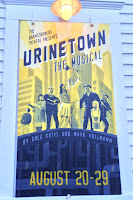 August 27, 2015 — The last time I was at the Barnstormers in Tamworth, New
Hampshire, artistic director Bob Shea addressed the audience as usual before
that night’s show, “The Hollow,” and promoted their next show, which he
described as “the unfortunately titled ‘Urinetown’.” Well, that’s exactly how I
felt about it. In fact, I had been avoiding “Urinetown,” which has played
somewhere every summer for the past dozen or so years, because I was put off by
the title. But it was the Barnstormers’ final show of their 85th
season, there’s only one more show on my schedule, and I was reluctant to let
go of this summer that seems to have gone by in a flash. So I made a
reservation for the musical comedy “Urinetown.”
August 27, 2015 — The last time I was at the Barnstormers in Tamworth, New
Hampshire, artistic director Bob Shea addressed the audience as usual before
that night’s show, “The Hollow,” and promoted their next show, which he
described as “the unfortunately titled ‘Urinetown’.” Well, that’s exactly how I
felt about it. In fact, I had been avoiding “Urinetown,” which has played
somewhere every summer for the past dozen or so years, because I was put off by
the title. But it was the Barnstormers’ final show of their 85th
season, there’s only one more show on my schedule, and I was reluctant to let
go of this summer that seems to have gone by in a flash. So I made a
reservation for the musical comedy “Urinetown.”
With music and lyrics by Mark Hollmann and book and lyrics by Greg Kotis, "Urinetown" opened on Broadway in 2001 and was nominated for ten Tony Awards and won three. The Barnstormers production was directed by Clayton Phillips. Here's the plot in a nutshell: a 20-year drought has caused a terrible water shortage
making toilets unusable. California should take note. Only public pay
facilities may be used, all controlled by a megacorporation named “Urine Good Company” (ouch!).
I was wrong to avoid this play. It has terrific musical numbers and biting satire attacking everything from corporations to the police to big government, and yes, even itself. The cast of seventeen, led by Jordan Ahnquist, Rachel Alexa Norman, Cheryl Mullings, Tony Edgerton and Dale Place wrapped the Barnstormers' season with arguably the year's best show. So if "Urinetown" comes to your town, get over the title and see it. You won't regret it.






